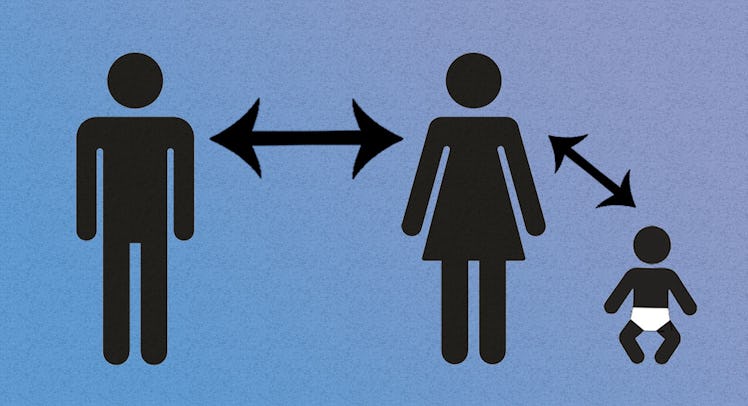How to Not Feel Like a Third Wheel In Your Own Home
When children arrive, it's common to feel like you're now second best. Because, you, well, are. But by maintaining balance you can keep that anxiety at bay.

Children inspire intense emotions within a second of their arrival. Love. Devotion. Crippling fear. Other emotions, however, take time to bubble up, like say jealousy and a bit of resentment. You’re happy to be a dad, but, steeped in fatherhood, you’re embarrassed to admit that you feel like you’re suddenly second best. It happens. There’s a reason why.
“Because you are,” says Dr. Pat Love, relationship expert and co-author of You’re Tearing Us Apart.
The change is really a question of simple math. The problem is that you were off in the original calculations. While you think that you’ve added one unit to your life, Love says that it’s actually two. There’s the existing relationship with your partner. Now, there are the two of you as parents and the child as an individual. And children dominate. Obviously. They’re 100 percent dependent on you for everything, so they get all the time, attention, and money on a never-ending loop.
An obvious truth: When kids arrive, the life that you knew where you had control is over. You don’t get to sleep when you want. You no longer have the same intimacy with your spouse. “Everything goes through the vortex of the kids’ needs,” says Dr. Guy Winch, licensed psychologist and author of Emotional First Aid. As Winch lays it out, there’s a new food chain: People ask about the baby. Not you. Relatives make sure the children get gifts. Not you. The fire department will save them first. Not you.
There’s a new food chain: People ask about the baby. Not you. Relatives make sure the children get gifts. Not you. The fire department will save them first. Not you.
All of this forces a change in self-identity. You can be skilled and accomplished, but it can feel like it doesn’t matter. “In your head, you’ve become secondary,” Winch says.
In short, it’s natural to feel like No.2. But this doesn’t mean it doesn’t feel shitty. So how do you get out of this headspace? You can’t subtract any of the child’s needs, so the only way to change your attitude is by adding positives. And, a big part of helping yourself is to recharge the relationship with your spouse. If you’re ignoring each other, kids pick up on that, yes, but it also helps you feel less secondary.“Partnering is the primary part of parenting,” Love says. “You need to love their mom. You need to make it a priority.”
It doesn’t have to be big displays, says Dr. Carl Hindy, clinical psychologist and author of If This Is Love, Why Do I Feel So Insecure? What most people want is appreciation and daily affirmations of their good work. You might think the sentiments are obvious, but chances are they’ve never been voiced. It could be as simple as texting, “How are you?,” in the middle of the day, or asking if there’s anything to pick up on the way home.
It’s also about making your partner’s load lighter. If there are dishes, a bathroom or laundry to wash, do it. If you can cook dinner or
just get take out, do it. If you see her pajamas, warm them up in the dryer. Anything that lowers stress/shows compassion is romantic. “Her life is better and your life is better,” Love says.After that, the work is about finding time for the two of you to be together. You well may be No. 2 on the family depth chart in perpetuity, but you’re still the No. 1 spouse and the relationship needs attention because it’s unavoidably morphed from the effortless pre-kid days when, every night, whether you knew it or not, was date night.
When you know an escape exists, there’s no need to resent your way through anything or anyone.
Yes, date night. The oft-recommended, rarely executed idea is said once again. It’s still a worthy thing to shoot for, all the experts agree. Winch says that if just for an hour, get dressed up and get out of the house to feel like adults and like you again. Even if you spend the time resisting the urge to call home, it still matters. You’ll see everyone has survived, a habit is built, and anxiety over your place in the new ecosystem doesn’t win.
This, of course, is hard to pull off on a regular basis. Hindy says that for the everyday outlet, establish predictable routines for the kids in the morning and especially at night. Once they’re asleep, that’s your golden time and all you need is 20 minutes. It could be backgammon or watching House Hunters while making snide comments — anything that’s shared and that reaffirms your similarities as a couple. If you want to talk, great, but it’s not necessary. It’s yours to enjoy each other and revel in, “Whatever it is, you and I survived it together,” he says.
The truth is that being a dad really isn’t about being an also-ran. You’re probably not that guy who needs to be No. 1 all the time, or at least you don’t want to be. But here’s what’s hard to realize when you’re all in it with kids: Parenting is draining, and it’s easy to let it become everything, but, as Winch says, nobody is built to do anything 24/7, no matter how much you enjoy it. You need a break. There needs to be some boundaries, for you as a couple and you as individuals, even if it’s an hour of something you enjoy every other week. When you know an escape exists, there’s no need to resent your way through anything or anyone.
“You’ll enjoy fatherhood so much more when you have a bit of your life back,” Winch says.